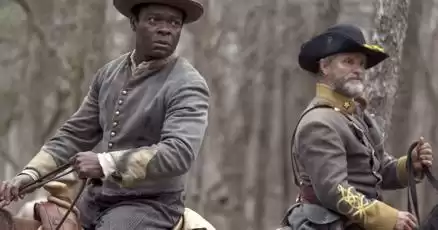'Unveiling the True Identity of Bass Reeves: Unraveling the Legend'
Former slave Bass Reeves rises to become the first Black U.S. Marshal west of the Mississippi in Taylor Sheridan's new Western Lawmen: Bass Reeves.
David Oyelowo stars as the protagonist in Taylor Sheridan's latest Western Lawmen: Bass Reeves, a captivating story that sheds light on one of the most revered but often overlooked lawmen of the Old West. Alongside Oyelowo, the film features notable actors such as Dennis Quaid and Donald Sutherland. The first installment of the anthology series chronicles Bass Reeves' remarkable journey from slavery to becoming the first African American U.S. Marshal west of the Mississippi.
The real Bass Reeves was a figure shrouded in legend. But how did a former slave achieve such status? Let's delve into the true story of Bass Reeves.
During the early 1870s, Indian Territory, which is now known as Oklahoma, was plagued by a multitude of criminals ranging from horse thieves to murderers. To restore law and order, President Ulysses S. Grant appointed Isaac C. Parker as the judge of the U.S. Court for the Western District of Arkansas. Parker, in turn, recruited James Fagan as the U.S. Marshal and authorized him to hire 200 deputy marshals to police the vast 74,000 square miles of Indian Territory. Parker's directive to the new deputies was clear: clean up the territory and bring the outlaws to justice, dead or alive. Among these deputies was Bass Reeves, the only Black man to be hired.
Born into slavery in Arkansas in 1838, Bass Reeves was taken by his master to Texas in 1846. At some point, he managed to escape and sought refuge in Indian Territory, where he immersed himself in the culture and customs of the Cherokees, Seminoles, and Creeks. He acquired invaluable skills in tracking, stalking, survival, and developed exceptional marksmanship. When the Emancipation Proclamation was enacted in 1863, Reeves was no longer a fugitive, and he returned to Arkansas, purchased a farm, and got married.
Following the Civil War, Reeves served as an interpreter for settlers returning to Indian Territory. He played a crucial role in safeguarding surveyors and later construction workers from being swindled by con men while the railroads were being built.
The appointment of Reeves as a deputy marshal raised eyebrows among those who questioned whether a former slave should wield a gun, make arrests, and handle federal prisoners. However, Reeves quickly gained the respect of skeptics due to his unwavering sense of justice and duty. He firmly believed in equality for all citizens.
Despite being illiterate, Reeves possessed an impressive memory and could memorize warrants as they were read to him. He never apprehended the wrong person, becoming renowned for his ability to capture criminals. In fact, many outlaws surrendered upon realizing that their capture was inevitable.
As a deputy marshal, Reeves traveled with a team consisting of a chuckwagon and cook, a posseman, and a tumbleweed wagon, which served as a mobile jail. Standing at an imposing 6 feet tall and weighing 180 pounds, Reeves commanded respect wherever he went.
Reeves would often be away from home for months at a time, armed with numerous warrants. He relentlessly pursued outlaws, braving harsh weather conditions, engaging in shootouts, and apprehending as many as 17 desperados at once, all for meager compensation. Reeves relished the thrill of the chase and the challenge it presented. Throughout his career, he apprehended over 3,000 men and women. Known for his honesty and integrity, Reeves always adhered to the letter of the law, even when he had to track down and arrest his own son, Ben, who had committed the unthinkable act of killing his wife.
In 1907, Reeves' illustrious 32-year career as a U.S. deputy marshal came to an end when Oklahoma achieved statehood, thus relieving the federal government of its responsibility to enforce the law in the former Indian Territory. Reeves had served longer than any other deputy in the Western District, with 21 of those years spent under Judge Parker. Following his tenure as a U.S. Marshal in Paris, Texas, he served as a policeman in Muskogee, Oklahoma, where not a single crime was reported during his watch. Despite walking with a cane, Reeves remained a commanding figure. He retired in 1909. On January 12, 1910, Bass Reeves passed away due to Bright's disease (nephritis).
Reeves' funeral was attended by hundreds of people, and his fellow lawman, Bud Ledbetter, hailed him as one of the bravest men the country had ever known. In 1992, Reeves was posthumously inducted into the Hall of Great Westerners at the National Cowboy & Western Heritage Museum in Oklahoma City. Two decades later, a bronze statue depicting Reeves on horseback, holding a rifle, with his loyal dog by his side, was erected at Pendergraft Park in Fort Smith, Arkansas. Every year in July, the Bass Reeves Western History Conference is held in Muskogee, Oklahoma, to honor his legacy.
For more information, visit 3riversmuseum.com.
Don't miss the premiere of Lawmen: Bass Reeves, exclusively on Paramount+ starting November 5th.
To learn everything you need to know about 'Lawmen: Bass Reeves,' click here.
-- Diana West
Reprinted courtesy of Harris' Farmer's Almanac












Comments on 'Unveiling the True Identity of Bass Reeves: Unraveling the Legend'